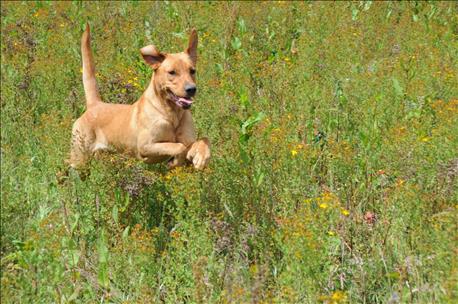
As best I recall the teachings of attitude and self-image were instruction I missed before I turned 30. The “greatest” generation made quick work of Hitler and Mussolini and the Japanese War Lords. From formal entrance into WW II in early December, 1941 until the conclusion in early August, 1945 (43 months) much of the world had been cleansed of aggression.

Good dogs know their job, and do their job. Getting a good dog - as well as good friends or a good cow - takes time to develop. (Photo: thinkstock/Ingram Publishing
At least 3 continents had been freed up from forces that had slaughtered millions of innocent men, women, and children. This work was mostly performed by a bunch of young men that were still teenagers. Girls moved to town and put the needed supplies and equipment together. A population that had been raised on little to nothing became almost bullet proof.
Back home life became mostly easy since WWII and America has become fat, rich, and soft. Few living people know what boots that are wet from sweat feel like the next morning. Obesity is our No. 1 disease.
My best friends have mostly passed. Reckon we don’t know what they were till they are gone. The ‘greatest’ generation may not have run around telling you about their love and reinforcing your self-image but they did understand many principles that now seem to be forgotten. One was honesty. Another was loyalty.
A.J. Townly was a mentor of mine. So was my father, Frank Cooke. Both were born in the first two decades of the 20th century. Both knew work. Townly used to say that every good man deserved to have one ‘good’ dog and one ‘good’ wife before he died. A.J. said he had owned several “good dogs”.
A little dog history
I have doctored on something like 20,000 dogs in my career. Only a shirt tail full were ‘good’ to anyone other than the owner. Half of them didn’t have any respect for their master. Actually, I question if those individuals had a physical two legged master since many were full of the devil.
“Good” dogs are honest and loyal. They spend their awake time serving the boss. They love such service. They know what the chief is thinking and what he expects. What he says is the gospel. A good dog is a wonderful, wonderful thing to behold. He loves his job. He knows his job. He performs his job at near perfection with just a little instruction. A good dog is the best of friends. You can count on them every time.
The problem with a ‘good’ dog is the fact that they never live long enough. The passing of the ‘good’ dog most usually precedes that of the master. It’s not a good time.
Good friends resemble good dogs. They are few and far between. They can read you from inside to out. They are loyal, completely loyal. You don’t have to watch your back. Your friend is there. Death is 100%. Our friends often precede us.
To have a good dog has an important requirement. We have to be a good master. The other component is time, both quantity and quality. Ditto the same for a good friend. Ditto mostly the same for good neighbors.
A good cow or steer is a little different (see Beef Producer May, 2014). But she is near perfect. Her work ethic is indisputable. She knows her job and performs it. You don’t have to wonder cause you know she’ll bring a goodun' in. She’s not perfect but she is close. She will likely be productive till she’s 18. But she never gets to stay long enough.
Perfection is an impossibility. It’s just not a perfect world. But chances are that most of us have room to strive toward the ethics of a ‘good’ dog or cow and become a “good” friend.
About the Author(s)
You May Also Like






